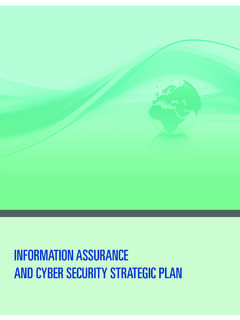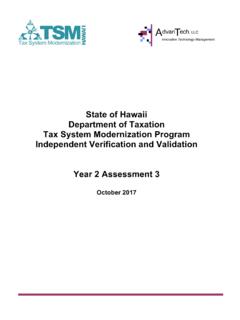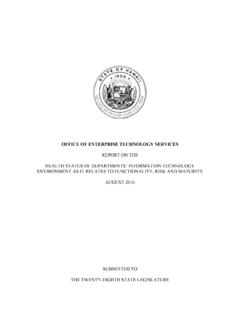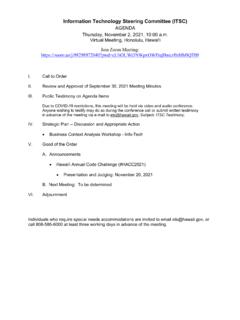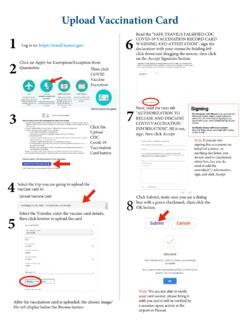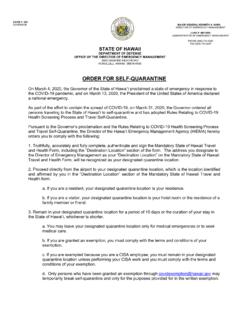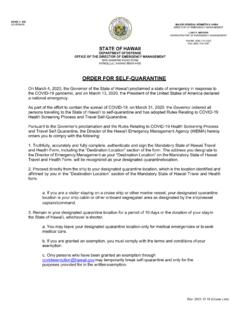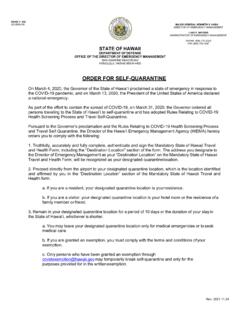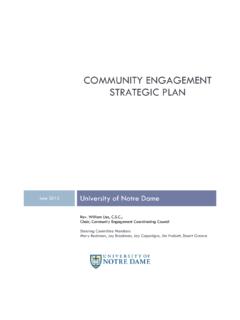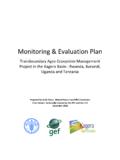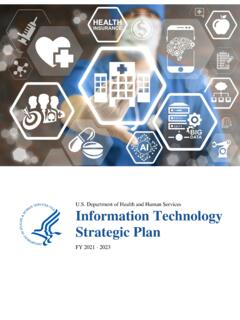Transcription of INFORMATION ASSURANCE AND CYBER SECURITY …
1 Table of Contents | 1 INFORMATION ASSURANCE AND CYBER SECURITY strategic PLAN2 | Table of ContentsCONTENTS1 EXECUTIVE SUMMARY ..6 2 INTRODUCTION ..8 Background ..9 Current and Emerging CYBER SECURITY Threats ..9 Outlook for 2013-2015 ..10 Counterintelligence ..10 Scope .. 10 Alignments .. 11 IA and CS Program Management plan .. 11 Purpose and Benefits .. 11 3 FUNDAMENTALS OF INFORMATION ASSURANCE RISK MANAGEMENT .. 13 Basic Elements of the Risk Assessment Process ..16 Establish Relationships ..17 Develop Statewide Categorization Guidance ..17 Identifying Types of Risks ..17 Risk Categories ..18 Current Risk Assessment Methodologies ..19 Qualitative Method ..19 Quantitative Method ..20 Alternative Risk Assessment Methods ..21 Probabilistic Risk Assessment (PRA) ..21 Forensic Analysis of Risks in Enterprise Systems (FARES) ..22 Challenges Assessing INFORMATION SECURITY Risks.
2 22 4 strategic INFORMATION ASSURANCE AND CYBER SECURITY GOALS AND OBJECTIVES ..29 5 PERSPECTIVE ON INFORMATION ASSURANCE ..32 Commitment ..34 Department Heads and CIOs ..34 Directors, Chairs, Managers, and Other ..34 Chief INFORMATION SECURITY Officer (CISO) ..34 Communication plan ..36 Resource Management ..36 Measuring Quality ..36 6 INFORMATION ASSURANCE AND CYBER SECURITY DIVISION ..36 Garner Respect and Resources ..37 Demonstrate Top Management Support ..37 Establish Formal Communication Channels ..37 Foster Coordinated Team Effort to Safeguard INFORMATION ..37 Enable Better Allocation of Organizational Resources ..38 Minimize Associated Costs for SECURITY as a Service (SecaaS) ..38 Table of Contents | 3 Reduce Single Point of Failure ..38 Demonstrate Compliance ..38 Increase Efficiency and Productivity ..39 CYBER SECURITY Controls Branch (CSCB) ..40 Compliance, Auditing, and Policy Branch (CAPB).
3 40 Identity and Access Management Branch (IAMB) ..40 Public Key Infrastructure-Certificate Management Services (PKI-CMS) ..41 SECURITY Operations Monitoring Branch (SOMB) ..42 Deliver Situational Awareness ..42 Meet Business Operations Requirements ..42 Reduce Risk and Downtime ..42 Threat Control and Prevention ..43 Ease Administrative Overhead ..43 People and Responsibilities ..43 Escalation Path ..43 Audit and Compliance Support ..43 Incident Response and Recovery ..44 Meet Technical Operations Requirements ..44 Speed of Aggregation and Correlation ..44 Device and System Coverage ..44 Proactive Infrastructure Monitoring ..44 Uptime 24/7, 365 Days of the Year ..44 Support for Federated and Distributed Environments ..44 Forensic Capabilities ..44 Intelligent Integration with SOCs and NOCs ..45 The SOC in Action ..45 Multiple SECURITY Operations Centers.
4 46 Privileged Access Monitoring ..46 State of Hawai`i Data Privacy Program ..46 7 strategic plan ASSUMPTIONS ..47 8 CONSTRAINTS ..48 9 INFORMATION ASSURANCE AND CYBER SECURITY INITIATIVES ..49 10 GUIDANCE FOR PROGRAM MANAGERS AND PROJECT LEADS ..49 11 CONCLUDING REMARKS ..50 APPENDIX A - INFORMATION ASSURANCE AND CYBER SECURITY PROGRAM strategic INVESTMENT INITIATIVES ..51 CONTRIBUTORS ..51 SOURCES ..514 | Table of ContentsFIGURESF igure 1 - CIO s IT/IRM Transformation Vision .. 11 Figure 2 - SECURITY Life Cycle .. 14 Figure 3 - Risk Management Cycle ..16 Figure 4 - Impact Assessment of Various Incidents to Enterprise ..20 Figure 5 - Elements of INFORMATION ASSURANCE and CYBER SECURITY (Parkerian Hexad) ..24 Figure 6 - SECURITY Implementation Strategy Based on Importance vs. Complexity ..25 Figure 7 - INFORMATION ASSURANCE and CYBER SECURITY Capability Maturity Model with Example SECURITY Controls ..28 Figure 8 - INFORMATION ASSURANCE Branch Roadmap.
5 29 Figure 9 - CIO Top INFORMATION ASSURANCE and CYBER SECURITY Concerns (2011) ..33 Figure 10 - Recommended INFORMATION ASSURANCE and CYBER SECURITY Division Organization ..39 Figure 11 - Notional Shared Services Center Vision for Hawai`i ..46 Table of Contents | 5 TABLEST able 1 - SECURITY Controls Classes, Families, and Identifiers ..15 Table 2 - Identified Risks ..18 Table 3 - Differences in Methodologies ..19 Table 4- Impact/Likelihood of Impact to the Enterprise Matrix ..19 Table 5 - Factors in Risk Analysis Equation ..21 Table 6 - Example Risk Analysis Table ..21 Table 7 - CISSP 10 Domains of INFORMATION ASSURANCE ..23 Table 8 - Categories of SECURITY Controls Related to INFORMATION ASSURANCE ..26 Table 9 - Maturity Levels of SECURITY Controls Related to INFORMATION ASSURANCE ..26 Table 10 - IA and CS Staff Distribution of Full-time Equivalents ..26 Table 11 - Description of Investment Initiatives Tables ..536 | State of Hawaii Business and IT/IRM Transformation plan Governance | INFORMATION ASSURANCE and CYBER SECURITY strategic Plan1 EXECUTIVE SUMMARYS tate of Hawaii Business and IT/IRM Transformation plan Governance | INFORMATION ASSURANCE and CYBER SECURITY strategic plan | 7In 2010, the Office of the Governor introduced a New Day plan designed to take a fresh look at many of State s most significant investments with the aim of enhancing efficiency and effectiveness in key areas.
6 The INFORMATION Technology (IT) program was an investment focused on early in the new administration. The State s IT program supports a complex, diverse, and multifaceted mission and has been identified as requiring enhancements to its IT SECURITY component. In recognition of the need to provide these enhancements, the State s IT management has undertaken efforts to address IT SECURITY and compliance areas that need enhancement to provide the additional protection to sensitive State and personal INFORMATION by refocusing its resources and reevaluating its goals. The result of this re-evaluation is reflected in the following plans: INFORMATION ASSURANCE and CYBER SECURITY Program Management, the INFORMATION ASSURANCE and CYBER SECURITY strategic , INFORMATION ASSURANCE and CYBER SECURITY Governance, Disaster Recovery and Continuity of Government, and document presents State s INFORMATION ASSURANCE and CYBER SECURITY strategic plan supporting this initiative.
7 strategic plans covering all aspects of business, IT, and INFORMATION resource management (IRM) have also been developed and identified as Phase II transformation efforts. Although the projects and the strategy have been well vetted, they are subject to change pending final approval of State s IT Governance INFORMATION ASSURANCE and CYBER SECURITY strategic plan , referred to as the plan , has been prepared in response to the Chief INFORMATION Officer Council (CIOC), Enterprise Leadership Council (ELC), and the Enterprise Architecture Advisory Working Group (EA-AWG) as a vital component of the State of Hawai`i Business and IT/IRM strategic Transformation plan . The plan is a direct result of briefings provided to the Chief INFORMATION Officer (CIO) addressing improvement of the INFORMATION Resources Management of INFORMATION ASSURANCE and CYBER SECURITY within the State. Under the leadership of the CIO, the INFORMATION ASSURANCE and Privacy Advisory Working Group (IA&P-AWG), hereafter referred to as the authors, prepared this document.
8 This plan recommends both a strategic and tactical approach to IT SECURITY improvements using a risk management framework that addresses current and future needs of the State s SECURITY posture while recognizing the technical, financial, and cultural needs of State s organizational subcomponents. The plan includes initiative and project recommendations that specifically focus on enhancements and advancements that address specific SECURITY needs and establish a long-term (three-to-five year) strategic direction for the INFORMATION ASSURANCE (IA) and CYBER SECURITY (CS) noted earlier, the strategy outlined in this plan is a companion document meant to complement the Office of INFORMATION Management and Technology s (OIMT s) IT/IRM Transformation Architecture. The IA and CS strategic , Program Management, Continuity of Operations and Disaster Recovery, Privacy, and Governance plans identify much of the foundational structure. The management roles, responsibilities, and oversight functions; risk-management processes; compliance, SECURITY , and efficiency goals; and foundational program and project management processes necessary to support the strategic direction and tactical efforts are identified in this preparing the plan , the authors evaluated the current state of IA and CS within the State at the department, division, and branch levels.
9 Using legislated requirements, educational studies, industry and government best practices and planning documents, department and organizational commitments and lines of business (LOBs), and the experience and knowledge of the team members to build a list of prioritized initiatives, a strategy was developed that will help to focus State s technology adopting any of the initiative recommendations identified, a significant improvement the State s SECURITY posture will be of the recommended initiatives represent significant investments of both capital and human resources; however, the benefits derived in implementing these initiatives greatly outweigh the potential risks associated with damage to State s reputation, mission activities, and public EXECUTIVE SUMMARY8 | State of Hawaii Business and IT/IRM Transformation plan Governance | INFORMATION ASSURANCE and CYBER SECURITY strategic Plan2 INTRODUCTIONS tate of Hawaii Business and IT/IRM Transformation plan Governance | INFORMATION ASSURANCE and CYBER SECURITY strategic plan | 9 This plan defines and prioritizes a number of IA and CS initiatives that the State must undertake to enhance the protection of INFORMATION .
10 While referred to as a strategy, the plan is more properly a list of strategic investments. In preparing the plan , the authors have made a strong effort to consolidate previously identified projects (where practical), provide scope and definition to each of the identified efforts, identify the general risks addressed by the initiative, and provide a foundation that can later be refined by formal project teams. In addition, to support a higher-level evaluation of which initiatives can be undertaken and when, the plan attempts to identify any significant dependencies associated with the BACKGROUNDThe State s various mission objectives, geographically diverse organizational structures, and many partnerships present unique technical challenges. The effectiveness of the techniques currently employed within the departments to address risks to INFORMATION is inconsistent, and the use of the technologies has not been used to maximum capabilities.
